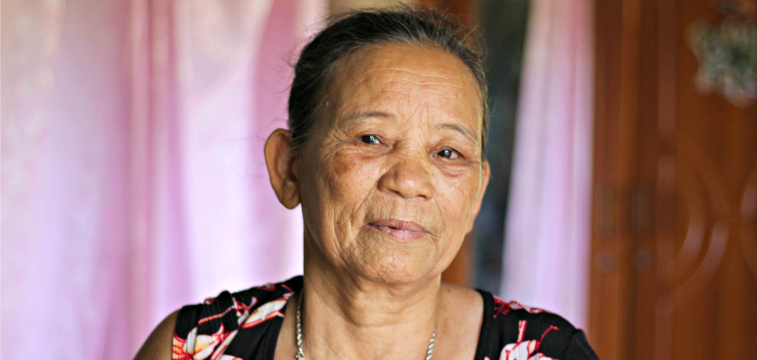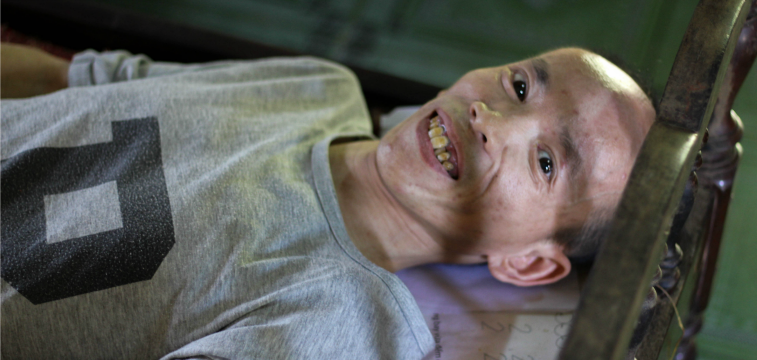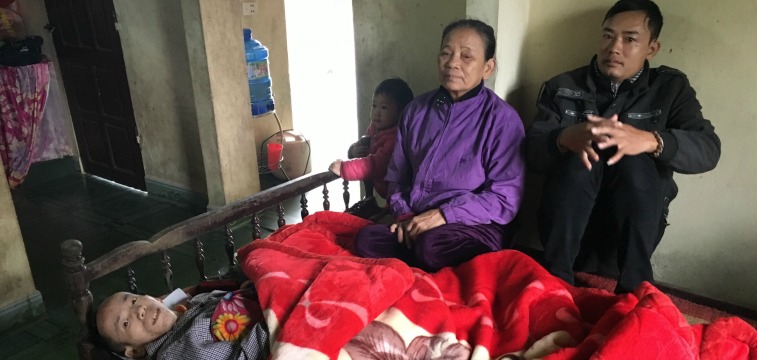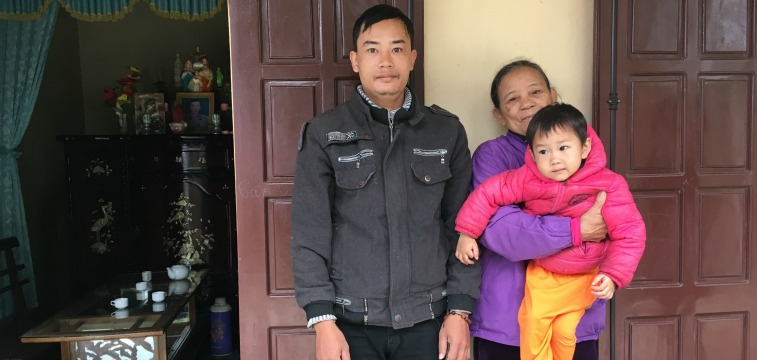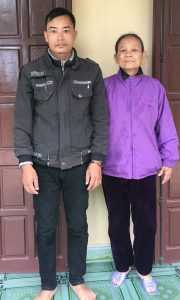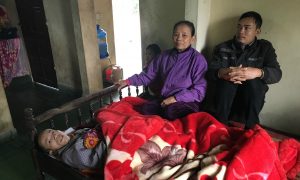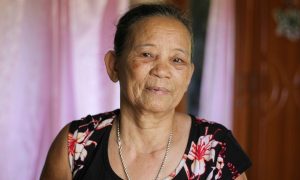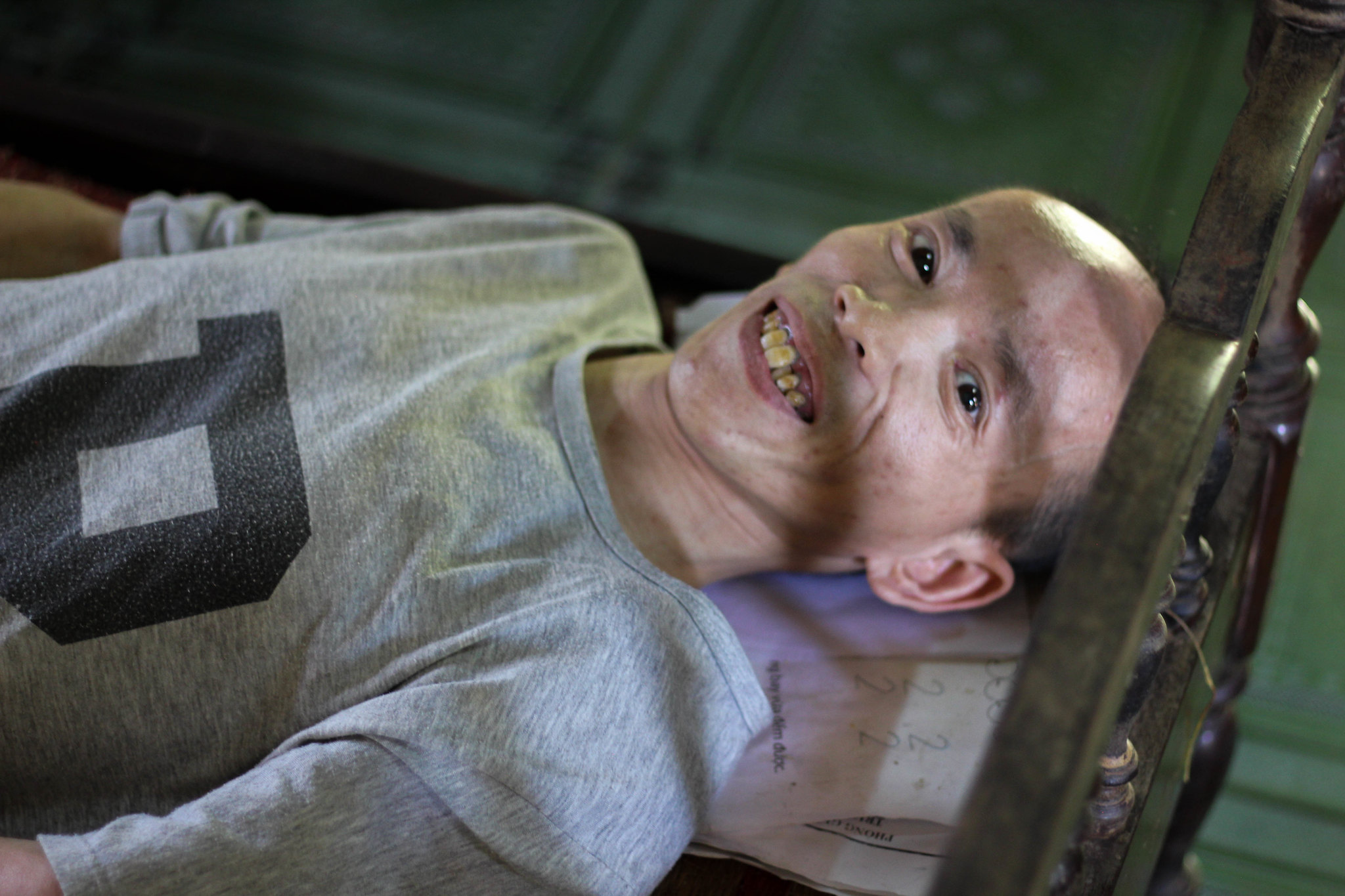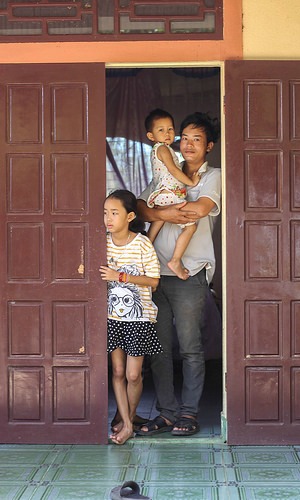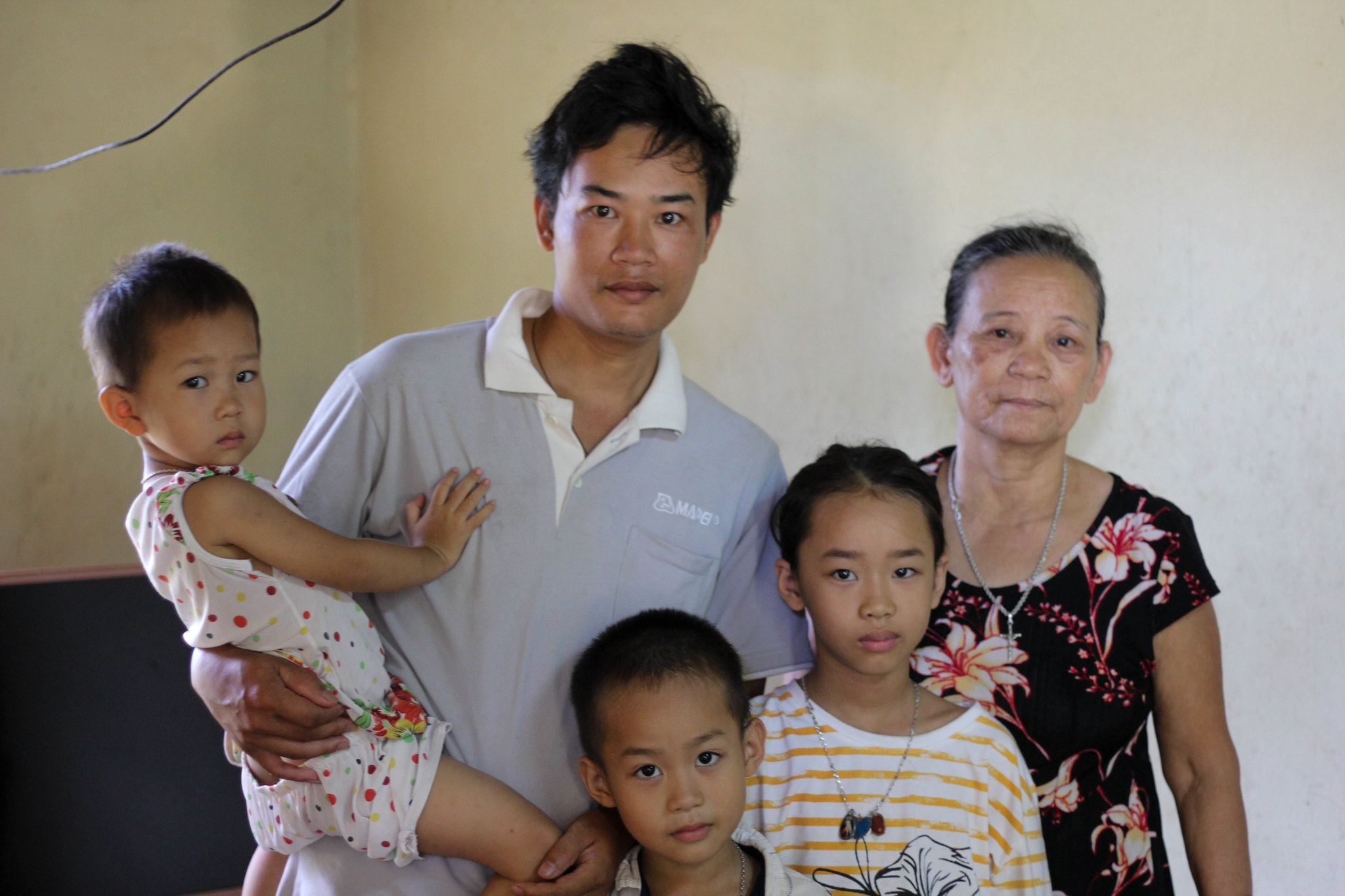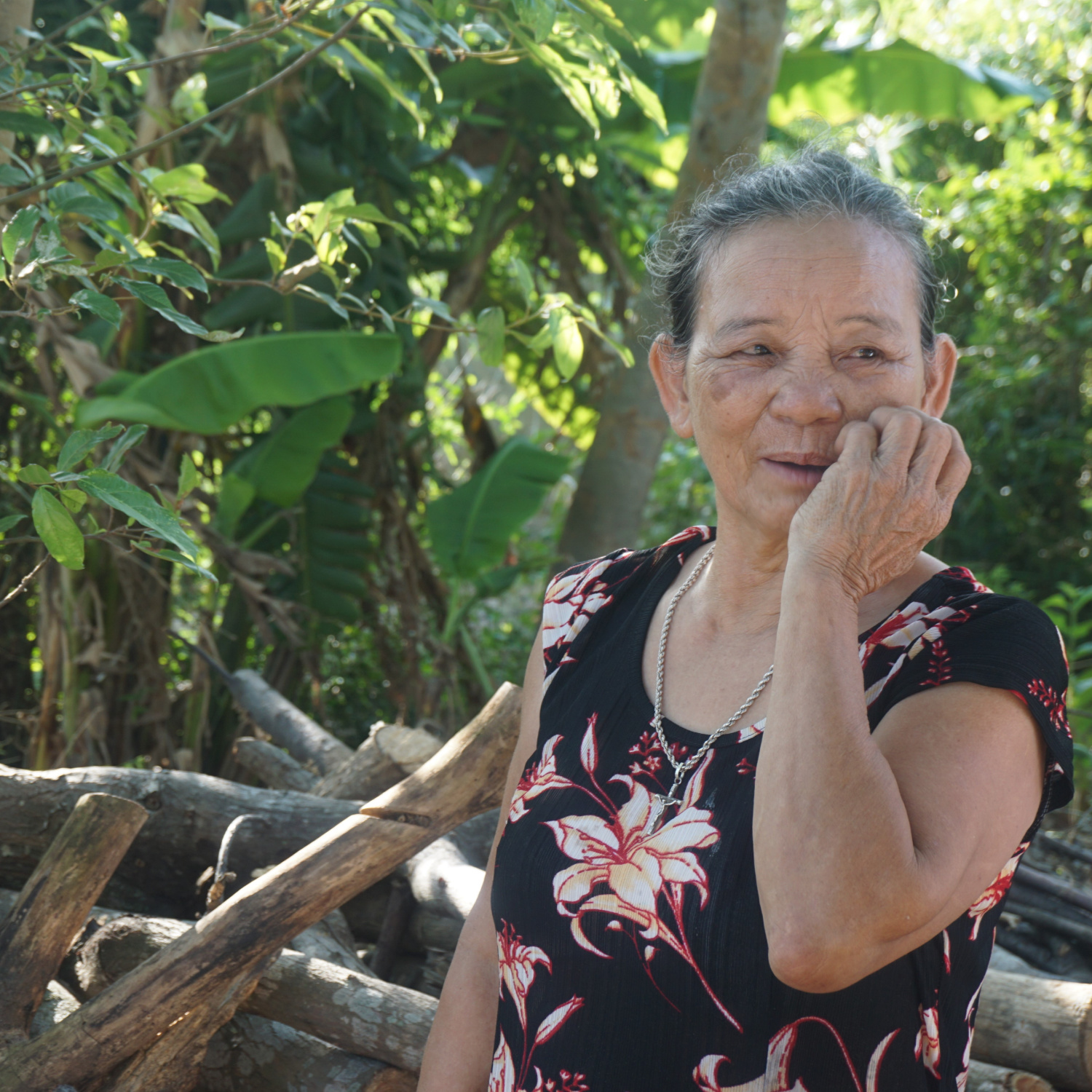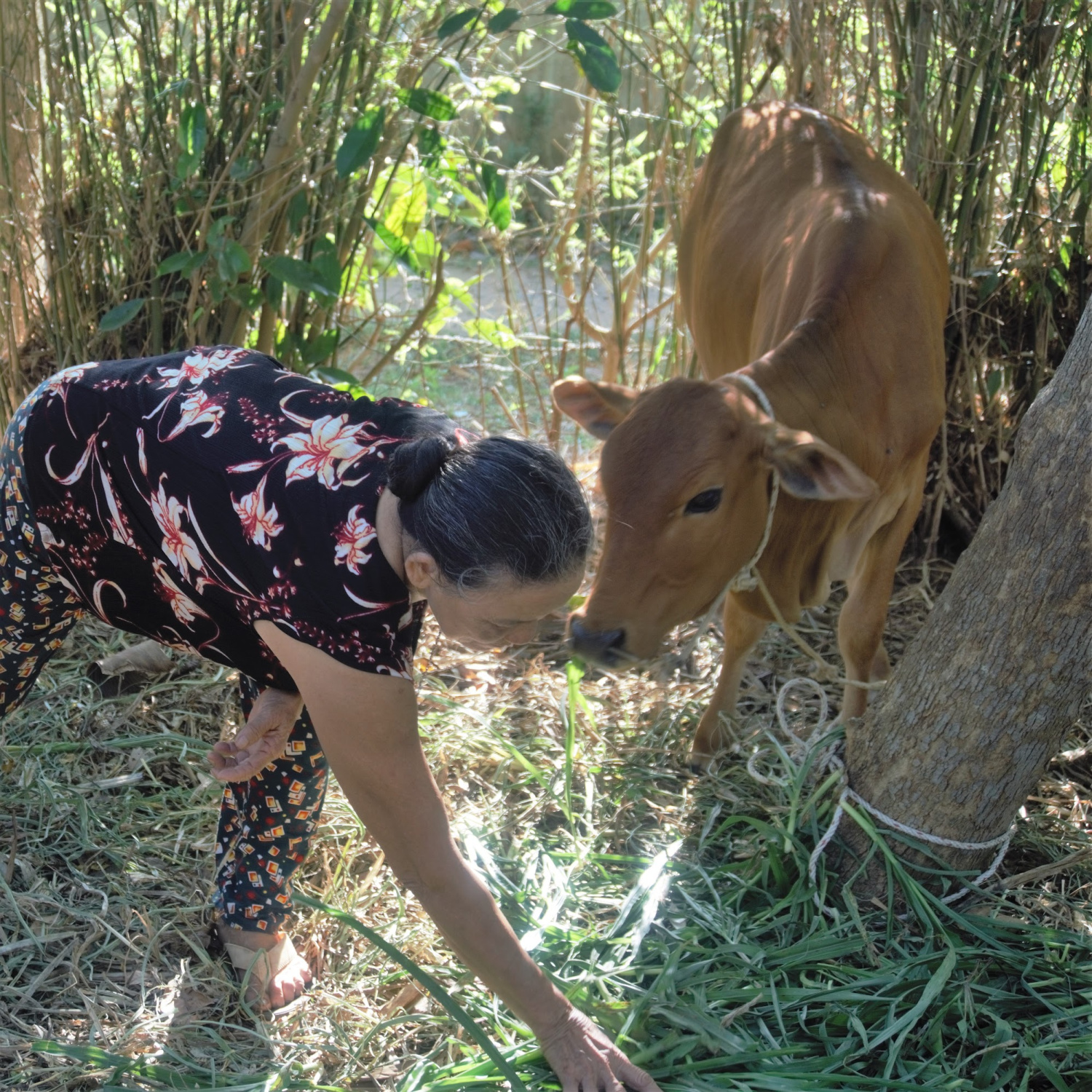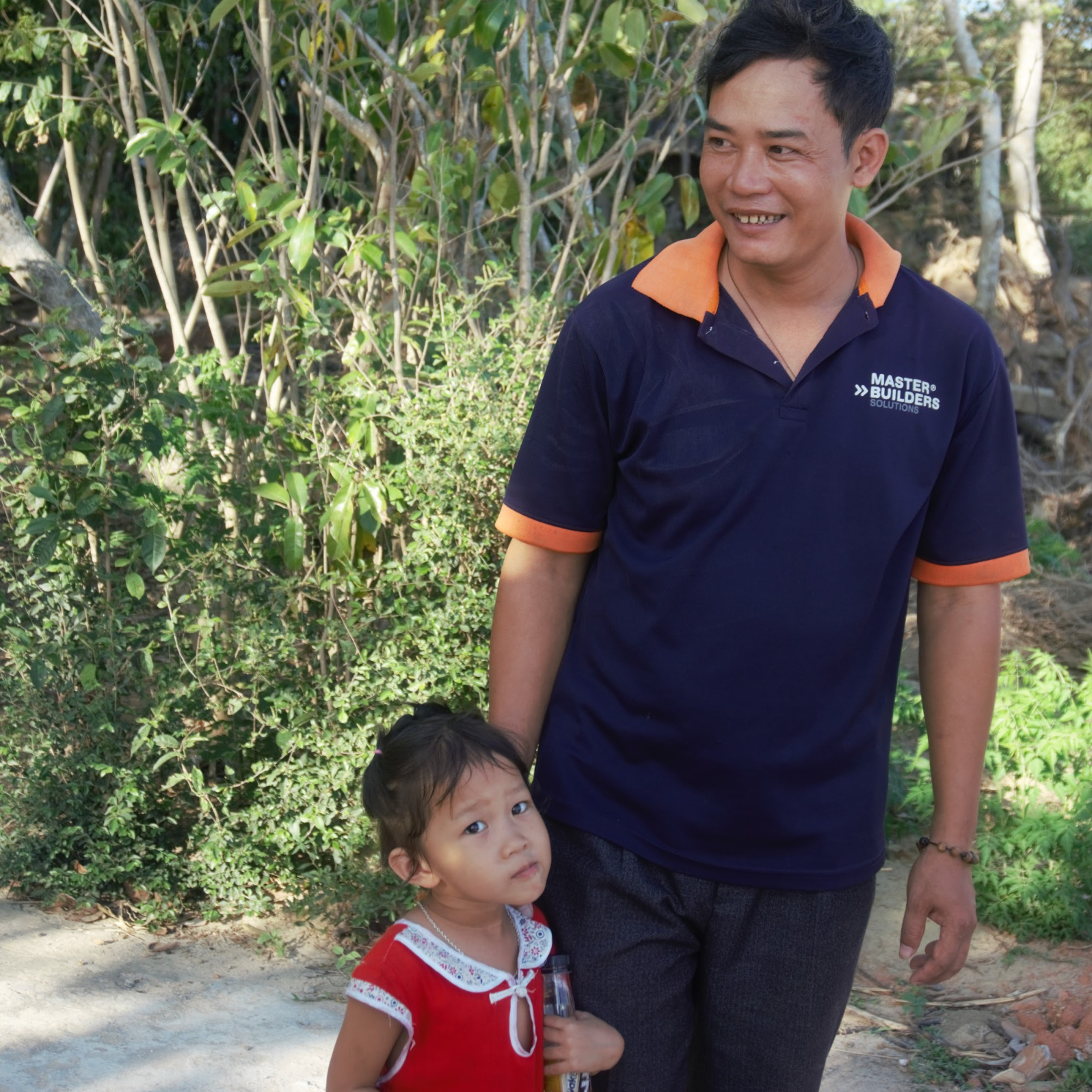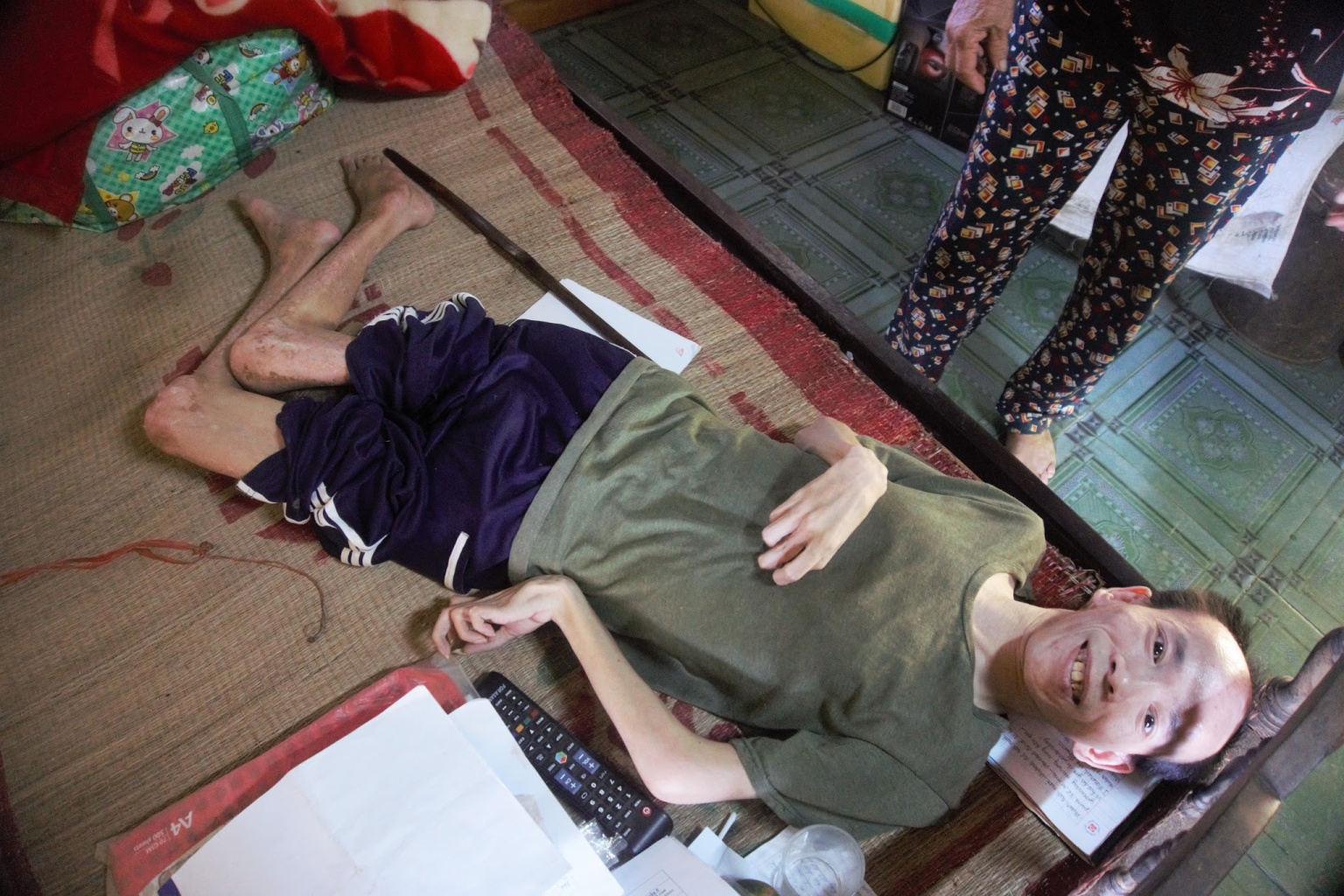Ms. Vo Thi Toa and Her Sons
Aging widow denied Agent Orange compensation for her son
Profile by Karen Delaney, January 2018Vo Thi Toa welcomes us to her house and offers us tea. She starts talking before I ask any questions and then begins to cry. Our translator Ngoc tells me that Mrs Toa is desperate. She sits next to her son, Long, and holds his child, her grandchild, on her lap. Nguyen Van Thuan, the AEPD outreach worker, sits with us. Mrs. Toa’s husband joined the army before 1975 and was exposed to Agent Orange (AO). He died in 2005 from stomach cancer. When he was alive he received a compensation for being a veteran, but no AO compensation. Their house was given to them by the Vietnamese Association of Victims of Agent Orange (VAVA) and cost 20 million Dong (US$880). Three of Ms. Toa’s six children are affected by Agent Orange. Her oldest son, Nguyen Thanh Nam (40) has cerebral palsy. He is confined to his bed and depends on his mother for everything. He was diagnosed by doctors only when he was 7. He receives 1.3 million Dong (US$55) a month as AO compensation. Her second son, Nguyen Ngoc Thang (38), is married and lives with his own family, who care for him. He is also a victim of Agent Orange and suffers from peritonitis and cholecystitis. His mother tells me he has had five surgeries so far. He received 800,000 Dong (US$ 34) a month in compensation. The Third son, Nguyen Thanh Long (33), who sits with us at the table, is very quiet and doesn’t say anything. He is married, with three children, and they all live in the house with Ms. Toa. His wife is working in China, but Mrs. Toa tells me she doesn’t send any money to them. Long’s three children are unaffected by Agent Orange. He started having epilepsy in October of 2016. Mrs. Toa sold the cow she had to pay for his care. They are working on the paperwork to list him as an AO victim. At the moment he gets no compensation. When he had his first episode, they took him to the hospital in Hue for treatment, where he stayed for six months. Now he goes to the local hospital once a month for treatment. While the medication is covered by insurance, the cost of traveling is not. Mrs. Toa tells me that when she had a cow, she used it for farming in the rice field. Now neighbors and relatives sometimes help and bring them food. After talking, we go inside to see Nam, who is paralyzed and in bed. He is 40 years old and looks older than the other AO victims I have met. He doesn’t seem bothered to see us there and does something that resembles a smile when I take out my phone out for pictures. Mrs. Toa thanks me and gives me a tight hug. She then holds my hand as she walks us back to the car.
Update by Marcela De Campos, July 2018I visited Ms. Toa’s family during my first field trip in early July. Ms. Toa last met with an AP staff member in January In January when her family was being considered for a grant under AP’s Agent Orange campaign. Eight months later, the family’s situation has worsened and AEPD has identified them as a priority family. Ms. Toa is a 71-year-old powerhouse. We sit in her two-bedroom home donated by the Vietnamese Association for Victims of Agent Orange in the Bang Village of the Bo Trach District, Quang Binh. She is the head of her household and her family’s primary caregiver. Speaking softly yet firmly, she looks to her late husband’s, Mr. Nguyen, portrait every few minutes throughout our conversation. There is a discernible pain in her voice and we learn that Mr. Nguyen passed away in 2005 of stomach cancer. He joined the army before 1975 and was exposed to Agent Orange. The couple had six children, three of whom are affected by Agent Orange: Nguyen Thanh Nam (40 years old), Nguyen Ngoc Thang (38 years old), and Nguyen Thanh Long (34 years old). Their other three children are now married and have moved away to live with their families. They were not affected by Mr. Nguyen’s Agent Orange exposure. Nam is the oldest son. He is the most severely affected by his father’s exposure to Agent Orange. Nam has cerebral palsy and is quadriplegic. He receives Agent Orange compensation of 1.3M VND ($55 USD) per month from the government. Nam spends most of the time lying on his bed. Ms. Toa carefully moves him every so often to prevent bedsores. She admits that caring for Nam is taking a toll physically. Mrs. Toa allows me to take some pictures of her and her grandchildren while we wait for them to bring the cow and calf back from the field. As I take pictures of Nam, he is smiling at me and seems happy to have visitors. I try to let him know that I am saying hello. Mrs. Toa shows me how the fluid has begun to build in his knees because he cannot move from the bed. Before leaving I wave and he tilts his head as if to say goodbye back. If you are looking for the best Treatment in Singapore for knee pain, visit us.
Ms Toa’s second son, Thang, is married and lives with his family outside of Ms. Toa’s home. He suffers from peritonitis and cholecystitis and has had five surgeries so far. Thang receives 800,000 VND ($35 USD) per month in Agent Orange compensation. Despite his physical ailments, Thang is doing well thanks to his family’s support. The third affected son is Long, and we spend most of the time discussing his health challenges. He is sitting with us at the table but does not say a word. He has two daughters and one son, all of whom live with him and Ms. Toa. They climb over him, the sofa, and Ms. Toa as she speaks. Long’s wife works and lives in China but does not send back remittances. Ms. Toa explains that Long has some mental problems and suffers from epilepsy. The family went through all the procedures to get Agent Orange compensation for him in January 2018, but were not successful. Long is not considered an Agent Orange victim because his disabilities were revealed only a short time ago. Long had his first epileptic episode in October 2016. Ms. Toa was forced to sell the cow that had been used to work in rice fields to pay for his six-month treatment in Hue. When Karen visited the family in January of this year, the family’s biggest expense was travel. The medication Long was taking was covered by insurance. Fortunately, he is now able to receive treatment at the local clinic (meaning there are fewer traveling costs) but, and very unfortunately, the medication he had been taking is no longer effective. Long is now taking a new medication and it is not covered by insurance. Ms. Toa bears the heavy burden of providing and caring for her family. She is keenly aware that none are able to work in the fields and are not currently engaged in any sustainable income generating activities (although she’d like to be). The family lives of the assistance from their neighbors and the state (Nam’s social allowance and her widow’s subsidy). She has consulted with Mr. Tuan, an AEPD Outreach Worker, and would like to use any funds from AP to buy a cow. Having raised cows before, she is familiar with the processand feels that it offers the most sustainable form of livelihood for her family. The income generated (from the fertiliser and calves) will pay for Long’s medical treatment (travel and new medicine), food, and other household needs. Without this support Ms. Toa will continue to rely on the generosity of others.. Our AP campaign model seeks to provide a sustainable source of income for the families. If you read through her profile (above), you may have noticed that she had a cow and sold it to support her son’s medical treatment. This may be disconcerting to friends of AP being asked to support her next cow-rearing activity. But it shouldn’t be. Ms. Toa has steadily and (in many ways) single-handedly supported her family for the last two decades. What she chose to do with her previous cow was her decision and her decision alone. Moreover, Ms. Toa will be entering a partnership with AEPD and will be required to implement a business plan over the next two years that will help her to manage the project, encourage financial literacy and ensu long-term investment. Mr. Tuan, the AEPD Outreach Worker, will check in with Ms. Toa periodically (as he does with all campaign beneficiaries) on the successes and challenges associated with implementing the plan. After the two years are over, Ms. Toa will be strongly encouraged to continue in the way that suits her best. For example, she may decide to sell the cow once it has produced calves and keep a female calf. (See here for more information on the cow-rearing model.) She would, however, be required to obtain AEPD’s permission if she decides to sell the original cow. Our model holds the beneficiary, AEPD, and AP accountable. Based on my observations and conversations, Ms. Toa is fully committed to the plan and to investing in her family’s future.
Update by Mia Coward, July 2019It’s a Friday afternoon and we drove what felt like 30 minutes out of downtown Dong Hoi. We crossed a small bridge and skirted a beautiful lake where I was also able to see the fields and mountains. We then passed the first church I have seen since coming to Dong Hoi. It was beautiful and the color shone from its golden gates. In the car the heat and sun were unforgiving. We stopped midway to catch up with the AEPD outreach worker. He went ahead to let the family and officials know that we would be visiting today. To get to Ms. Toa’s home you have to travel through a very narrow dirt road. Our driver seemed to have no worries as he drove backward to ensure we would fit through the narrow dirt road and then turn around to drive toward the home. This was a tad scary for me but he had done it a thousand times so I just sat in the passenger seat and continued to look out the window. We pulled up to Ms. Toa’s home and get out. Ms. Vo Thi Toa’s husband, a military veteran, had been exposed to dioxin during his time in the service. He died in 2005 due to stomach cancer. Together they had six children; three of their children were affected from Agent Orange and three were not. Ms. Toa is the sole caregiver for her oldest son Nguyen Thanh Nam who is quadriplegic and has cerebral palsy) She also looks after her third son Nguyen Ngoc Thang, who has epilepsy), and 3 grandchildren. AP and AEPD offered help the family last July and were able to purchase a cow and calf with the donations. As we walk toward the inside of the home, I am greeted by the cow in the front yard, some small puppies running and playing, two chickens and some small chicks walking around. Ms. Toa seems to be in a happy frame of mind. I let Ngoc and the outreach worker take the lead as Ms. Toa jumps right into the conversation and shares the news that Long (her third son who also lives in the house) is doing much better since our last visit. Long has had two hospital visits but was able to go to a private clinic and start taking medication for his epilepsy. He seems in good spirits and smiles at me while listening to the conversation. As we talk, the children are running around, laughing and playing in the house and the oldest granddaughter says hello to me and smile. They are currently on a summer holiday. Later in our visit, I realize that Ms Toa can speak some English and I tell her where I am from, how to pronounce my name and my age. She is so sweet and really friendly to someone who is pretty much a stranger in her home. Ms. Toa tells us that fluid has built up in Nam’s legs and that he has lost a lot of blood. This has created swelling and wetness around his knees and leg muscles. She would like to take him to the hospital but is worried that no one would take care of her home while she is away. I can tell that Ms Toa really wants to help her son. Long, the oldest brother, does not live in the home but also suffers from the effects of Agent Orange is paralyzed and continues to deal with pain from peritonitis and cholecystitis. Mrs. Toa walks everywhere to buy food, to manage the animals, and help her grandchildren. Because of this, she is struggling with some back pain and knee complication. If one of her sons has to visit the hospital she will ask neighbors to take them. Her other four children and relatives live very far from her home and work far from home so they are not able to visit much and help her. Ms Toa is able to manage the cow and a calf that were donated by AP and AEPD, and her fourth son (who is not affected by AO) sometimes comes in to help. The calf is growing well and the cow is 3 months pregnant. Ms Toa uses the fertilizer in the garden. She has no intention of selling the cow or calf, and will only take this drastic action if she needs money to cover medical care for one of her sons. Ms Toa is also raising some chikens for food. Because of her knees she is unable to work in the rice field, so the chickens are an important addition to the family diet. Mrs. Toa still receives 1.5M VND in government compensation for her oldest son and 850,00 VND a month as a widow. Long does not qualify for compensation because his Agent Orange symptoms (epilepsy) appeared recently. At first they were not recognized by the disability council, but AEPD recntly helped the family secure 405,000 VND a month. Some say that mental and physical impairments are more likely to be recognized than epilepsy and the process of being considered is certainly long and difficult. Mrs. Toa’s only sustained source of income comes from government compensation, and she uses this for daily expenses. Sometimes she is able to get money from her other children but only when one of her sons has to go to the hospital. We ask if Ms Toa has taken out any loans and if she has any savings or interest in saving in the future. Mrs. Toa replies that she borrowed 10M VND from her other children when Long had to go to the hospital twice in the past year. She has no deadline or interest to repay but may have to sell the calf to pay back the loan itself. She will keep the cow for breeding. I also find out that selling a cow or calf has a lot to do with weather conditions. It will be harder to find a buyer if the weather is bad. Mrs. Toa tells us that she cannot afford to take out another loan. She tells us that the local government used to offer something similar to a savings group but it was too hard for the Agent Orange families to save even the lowest amount. Ngoc tells me that this is because many of the caregivers are elderly mothers who work the land or in the home. Mrs. Toa also says that that she would not be able to contribute to a savings group.
The oldest granddaughter is with me and suggests photos I should take. I feel happy that we have been to able to help this family and that Long seems to be improving. Hopefully, Mrs. Toa can eventually take his brither Nam to the hospital to check on his legs, which seem to be her biggest worry.
|

